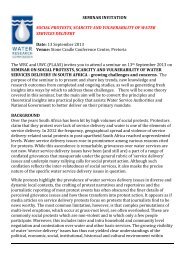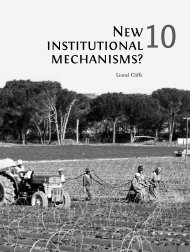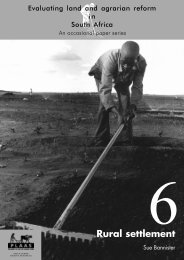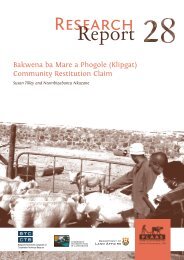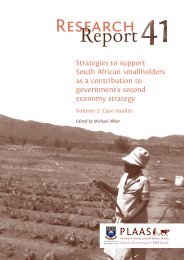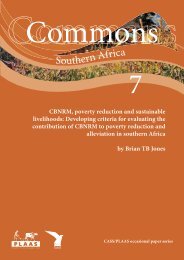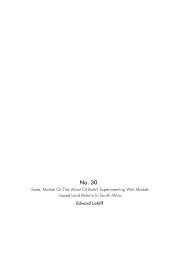All of our work hashad a strong applieddimension, and <strong>PLAAS</strong>researchers have oftenengaged in policydebatesINTRODUCTIONThe Programme for Land and Agrarian Studies (<strong>PLAAS</strong>) celebrates its 10th anniversary this year. Over the lastten years we have undertaken research on land and agrarian reform, the changing composition of livelihoodsand poverty dynamics in both rural and urban contexts, rural governance, community-based natural resourcemanagement, fisheries management, and linkages between land and water rights. All of our work has had astrong applied dimension, and <strong>PLAAS</strong> researchers have often engaged in policy debates and argued stronglyin favour of particular objectives and ways to achieve them.Recurring themes within <strong>PLAAS</strong> research are patterns of poverty and inequality, the character anddistribution of property rights, and contested power relations, all of which are central to the task of socioeconomictransformation after apartheid. These are complex aspects of social reality, and understandingtheir structure and the underlying causal processes at work is extremely challenging. We have striven tobalance our concern for policy relevance and our commitment to social change with a strong emphasis onrigorous and theoretically well-informed scholarship.We have also developed a post-graduate teaching programme in land and agrarian studies, the only one ofits kind in the region, and delivered a wide range of short training courses for government officials and NGOworkers.In celebrating our 10th anniversary this year, we will be reflecting on whether or not we manage to live up toour mission, and asking what key questions and issues we should address in the decade to come.<strong>PLAAS</strong>: A BRIEF HISTORY<strong>PLAAS</strong> is a constituent unit of the University of the Western Cape’s School of Government, and was initiatedin 1995 with a core grant from the Ford Foundation. This was renewed biannually until 2003. Ben Cousinswas seconded from the Department of Anthropology and Sociology to establish a programme to train blackapplied social scientists in the land and agrarian reform sector, and to engage in policy-relevant research.Soon after its establishment, <strong>PLAAS</strong> began to provide short courses to government and NGO staff, incollaboration with the Land Tenure Center at the University of Wisconsin-Madison and the Centre for AppliedLegal Studies at Wits University. <strong>PLAAS</strong> researchers were soon contracted by the post-apartheid governmentto provide advice and support to a variety of policy processes, notably in relation to land restitution, tenurereform and agricultural policy. Since then <strong>PLAAS</strong> has seen steady growth and currently employs a staff of 22,of whom 15 are researchers, six with doctorates.The core grant from the Ford Foundation will be phased out from October 2005, but in 2004 <strong>PLAAS</strong> receivedfrom the Foundation a sum of $500 000 towards an endowment fund. Increasing the size of this endowmentis the main focus of our current efforts to secure long-term sustainability. From 2003 the university hassupported the salary of the <strong>PLAAS</strong> Director, and, from 2004, a senior lectureship post at <strong>PLAAS</strong>. All otherpositions are funded through grants from donors or partners.Most income has beenin the form of grantsfrom internationalorganisationsFUNDING, DONORS ANDPARTNERSIncome to <strong>PLAAS</strong> from grants, training fees, consultancies, and publications sales between July 1995 andDecember 2004 amounted to R42 million (see Figure 1). Since 1999 income has averaged around R6 millionper annum.Most income has been in the form of grants from international organisations. Key donors have been the FordFoundation, Liberty Life Foundation, the International Development Research Centre of Canada, the SwissAgency for Development Co-operation, the Foundation for Human Rights (with funds from the EuropeanUnion), the Norwegian government, and the Department for International Development of the United1
R million10 000 0009 000 0008 000 0007 000 0006 000 0005 000 0004 000 0003 000 0002 000 0001 000 0001995 1996 1997 1998 1999 2000 2001 2002 2003 2004Figure 1: <strong>PLAAS</strong> income: 1995–2004Kingdom. Smaller grants have been received from the EuropeanUnion, the Land Bank, the Human Sciences Research Council, theGerman Development Agency (GTZ), the Department of Trade andIndustry, the Department of Environmental Affairs and Tourism(Directorate of Marine and Coastal Management), and the World FishCentre of Denmark.Training courses have also brought in funds. These have beencommissioned by a range of clients, including the Department ofLand Affairs, Danish Co-operation for Environment and Development,the National Land Committee of South Africa, the Environment andDevelopment Agency, Women on Farms, and the Southern Africanoffice of the World Conservation Union (IUCN).Significant funds havealso been sourcedthrough collaborativepartnerships with otherresearch institutionsSignificant funds have also been sourced through collaborative partnerships with other research institutions.Longstanding international partners include the Environment Group at the Institute for Development Studies(IDS) at the University of Sussex, the Institute for Development Policy and Management (IDPM) and theChronic Poverty Research Centre of the University of Manchester, the College of Fisheries Science at theUniversity of Tromsø, the Centre for Environment and Development Studies (Noragric) at the NorwegianUniversity of the Life Sciences, the Norwegian Centre for Human Rights at the University of Oslo, and theInstitute for Fisheries Management & Coastal Community Development (IFM) of Denmark.A close and long established relationship continues with the Natural Resources Group of the Centre forDevelopment Co-operation Services (CDCS) at the Vrije Universiteit in the Netherlands. Dr Stephen Turnerof CDCS was seconded to <strong>PLAAS</strong> for four years (1997-2001) and continues to collaborate with <strong>PLAAS</strong> in avariety of ways.Other important collaborations have occurred with the Land Tenure Center at the University of Wisconsin-Madison, the Overseas Development Institute of London, the International Institute for Environment andDevelopment in London, the University of Bergen and the Chr. Michelsen Institute (both of Norway), theUniversity of Cork in Ireland, the University of Köln in Germany, the African Centre for Technology Studies(ACTS) of Kenya, Community Conservation and Development Initiatives (CCDI) in Nigeria, and the SocialResearch Centre at the American University of Cairo, Egypt. A partnership has recently been established withthe International Water Management Institute (IWMI).Within the region, a longstanding and close working relationship is maintained with the Centre for AppliedSocial Sciences (CASS) at the University of Zimbabwe, principally through joint management of a regionalnetworking and research programme in community based natural resource management. Other regionalpartners include the regional office of the World Conservation Union (IUCN) in Zimbabwe and its office inMozambique.Closer to home, <strong>PLAAS</strong> and the School of Public Health at UWC have developed a close partnership inrelation to poverty research. <strong>PLAAS</strong> has often worked closely with the National Land Committee and itsaffiliates (for example, Nkuzi Development Association, the Association for Rural Advancement, the SurplusPeople Project and the Border Rural Committee) and other NGOs such as the Centre for Rural Legal Studies,the Legal Resources Centre, the Legal Entity Assessment Project and the Trust for Community Outreach andEducation. A close collaborative relationship to provide short course training has been maintained since1996 with Rick de Satgé of Developmental Services.An excellent long-term research partnership with Prof Timm Hoffman, formerly at the National BotanicalInstitute and currently Director of the Leslie Hill Institute of Plant Conservation, has been maintained since1995, centred on multi-disciplinary research in the Leliefontein Communal Area of Namaqualand. A <strong>PLAAS</strong>Research Associate, Dr Rick Rohde, has led the socio-economic aspects of this research for <strong>PLAAS</strong>.Collaborative research and teaching have been undertaken with lawyers from the Legal Resources Centre,and individual scholars from the Universities of Cape Town, Stellenbosch, Rhodes and Witwatersrand, andalso with researchers from the Integrated Rural and Regional Development programme of the HumanSciences Research Council.2




